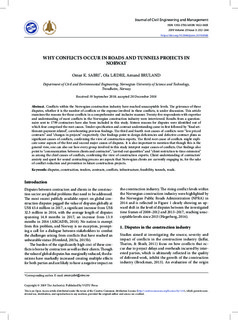WHY CONFLICTS OCCUR IN ROADS AND TUNNELS PROJECTS IN NORWAY
Journal article, Peer reviewed
Published version

Åpne
Permanent lenke
http://hdl.handle.net/11250/2594116Utgivelsesdato
2018Metadata
Vis full innførselSamlinger
Originalversjon
Journal of Civil Engineering and Management. 2018, 25 (3), 252-264. https://doi.org/10.3846/jcem.2019.8566Sammendrag
Conflicts within the Norwegian construction industry have reached unacceptable levels. The grievance of these disputes, whether it is the number of conflicts or the expense involved in these conflicts, is under discussion. This article examines the reasons for these conflicts in a comprehensive and inclusive manner. Twenty-five respondents with expertise and understanding of most conflicts in the Norwegian construction industry were interviewed. Results from a questionnaire sent to 1799 contractors have also been included in this study. Sixteen reasons for disputes were identified out of which four comprised the root causes. Tender specification and contract understanding came in first followed by “final settlement-payment related”, corroborating previous findings. The third and fourth root causes of conflicts were “low priced contracts” and “changes in projects” respectively. Our findings point to design deficiencies and defective contract plans as significant causes of conflicts, confirming the view of construction experts. The third root cause of conflicts might explicate some aspects of the first and second major causes of disputes. It is also important to mention that though this is the general view, one can also see how every group involved in this study interpret major causes of conflicts. Our findings also point to “communication between clients and contractor”, “carried out quantities” and “client restriction to time extension” as among the chief causes of conflicts, confirming the view of construction experts. Client understanding of contractors’ anxiety and quest for sound contracting process are aspects that Norwegian clients are currently engaging in, for the sake of conflict reduction and prevention in future construction projects.
